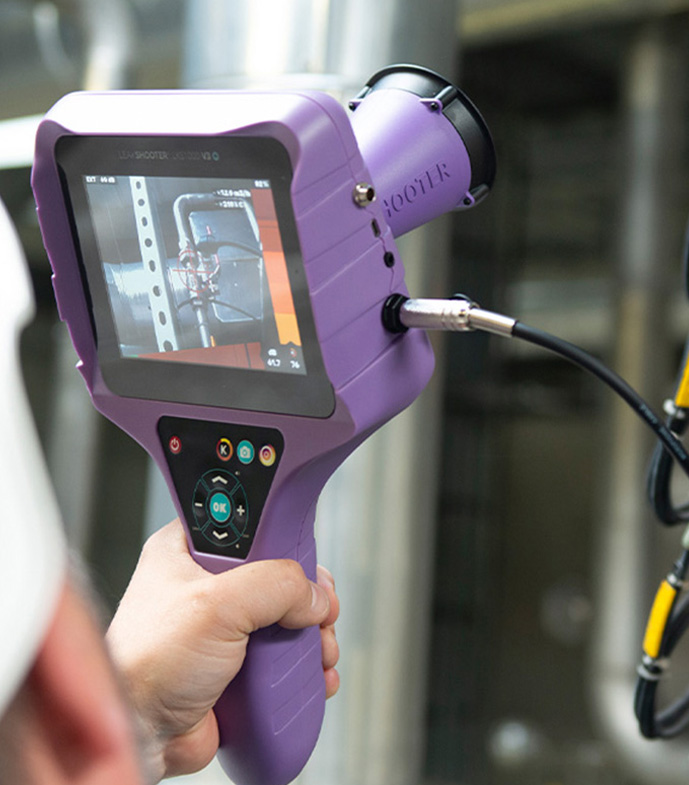Vacuum Leak Detection
Leaks in industrial vacuum systems can negatively affect system efficiency and pose safety risks. Leaks cause vacuum loss, which can increase energy consumption and disrupt proper process operation. Such leaks may lead to interruptions in the production line, reducing overall operational efficiency.
Leaks in vacuum systems can negatively impact efficiency and lead to serious safety risks. They result in vacuum loss, which increases operational costs and may cause system disruptions. Regular leak detection ensures the safe and efficient operation of vacuum systems, enhancing both safety and energy efficiency.
Inspections performed by expert teams are essential for detecting leaks in vacuum systems. Since vacuum conditions can allow leaks to escalate quickly and compromise system performance, it is critical to detect them in a timely manner. Periodic leak detection helps maintain smooth system operation and minimizes production interruptions.
Vacuum Leak Detection: Application Steps
The detection and management of vacuum leaks is a critical process for improving energy efficiency and reducing operating costs. Performing leak detection regularly helps optimize system performance and minimize energy losses. Accordingly, the vacuum leak detection process consists of the following key steps:
1. Preliminary Preparation and System Analysis
Before starting the procedure, detailed information is gathered about your facility’s pneumatic systems, connection components, and equipment density. Based on this analysis, the required working time is determined, and the most suitable detection method is selected. Possible methods include air leak detection, thermal imaging, and steam trap analysis.
2. Leak Detection Process
Within the scheduled timeframe, vacuum lines are thoroughly inspected using Synergys Technologies brand LKS1000 series devices. Leak points are precisely identified using ultrasonic measurement, sound analysis, and temperature variation methods. Detected leak points are photographed, documented, and properly labeled.
3. Reporting and Solution Recommendations
A detailed report of the detected leaks is prepared and presented to you. This report includes:
• Prioritization of leak points
• Section-based and equipment-based analyses
• Graphical representations, cost estimates, and air loss calculations
In addition, improvement and solution recommendations by our engineers are included in the report.
4. Overall Performance Evaluation
All components of the system are reviewed to assess the impact of leaks on energy efficiency. Based on the collected data, a comprehensive analysis of the system’s overall condition is provided.
5. Periodic Monitoring and Continuity
Leak detection should not be considered a one-time procedure but should be carried out at regular intervals. Depending on the number of air lines and the leak rate in your facility, this service should be repeated every 4 to 6 months. This ensures the reliable operation of vacuum lines and effective management of energy-saving processes.
Through this process, the efficiency of your compressed air systems is continuously monitored, and your facility’s energy costs are optimized.
Why Is Vacuum Leak Detection Important?
Leaks occurring in industrial vacuum systems can lead to serious issues in terms of both safety and efficiency. Vacuum plays a critical role in many industrial applications. Leaks can reduce system efficiency, cause energy losses, and increase operational costs.
Leaks in vacuum systems lead to pressure drops, preventing the system from functioning properly and forcing equipment to consume more energy. These leaks may grow over time, increasing efficiency losses and safety risks, ultimately resulting in larger and costlier problems. Regular leak detection not only improves energy efficiency but also minimizes operational interruptions.
In systems where regular leak detection is neglected, leaks may grow unnoticed, creating significant efficiency losses. Leaks can also cause unnecessary strain on equipment and shorten its lifespan. Moreover, they increase long-term operating costs.
Periodic vacuum leak detection ensures both the safety and efficiency of the system. Early detection of leaks helps prevent major breakdowns and reduces the risk of high repair costs. As a result, the vacuum system operates safely, critical processes continue without disruption, and operating expenses are reduced.
Routine inspections by expert teams detect leaks in vacuum systems early on, preventing major failures and the need for costly repairs. Therefore, maintaining a regular vacuum leak detection program provides long-term reliability, energy savings, and cost advantages for your facility.

Frequently Asked Questions
Learn more about vacuum leak detection.
Vacuum leak detection is the process of identifying leaks that may occur in industrial vacuum systems. Vacuum systems are critically important for many industrial processes. Leaks can reduce system efficiency, lead to energy losses, and increase operational costs. Regular leak detection identifies such issues early, ensuring the system operates efficiently and safely.
Vacuum leaks are typically detected through visual inspections, specialized leak detection devices, and pressure measurements. Using high-precision equipment, leak points are identified and necessary repairs are carried out at those locations. Ultrasonic tests and temperature differential measurements are also commonly used methods.
If regular leak detection is not performed in vacuum systems, leaks may grow and reduce system efficiency. This can lead to unnecessary energy consumption and high operating costs. In addition, undetected leaks can increase safety risks and shorten equipment lifespan. Over time, leaks may result in major failures, requiring significant repairs and system downtime.
We Support Your Business with High-Quality Products and Services Worldwide
Optimize your operations with our compressed air solutions that adapt to evolving industrial needs, and stay ahead of the competition by increasing your efficiency.

Since 1969, our family-owned company—now in its third generation—has specialized in industrial filtration and compressed air, delivering the most reliable solutions in the industry to meet business needs at the highest level. With our Istanbul-based operations and robust logistics network, we provide fast and efficient service to customers across Turkey.
Compressed Air
Measurement, Control, and Detection Devices
Compressors
Air Treatment Units
Dust Collection Systems
Filter Group
Tepeören Mah. İTOSB 14th Street No:2 34959 Tuzla / ISTANBUL
Monday – Friday 08:30 AM – 06:30 PM
+90 216 661 40 44
[email protected]